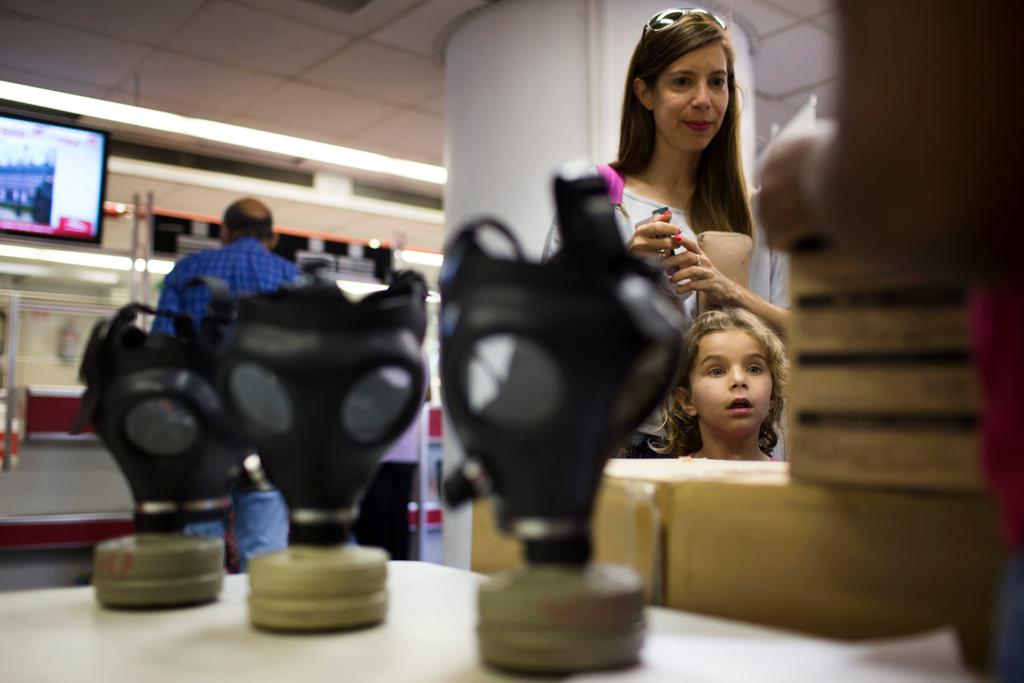View from Israel: Why are chemical weapons the game changer in Syria?
Israelis wait in line to pick their gas masks at a distribution center on August 26, 2013 in Tel Aviv, Israel.
JERUSALEM — In August 2012, about 18 months into the Syrian civil war, President Barack Obama declared that his administration’s red line in the conflict would be when “we start seeing a whole bunch of chemical weapons moving around or being utilized.”
“That would change my calculus,” he said. “That would change my equation.”
Almost a year later to the day, on Aug. 21, images of the apparent massive use of lethal chemical weapons began streaming out of Syria: gray, lifeless bodies were shown wrapped in white cloth and lined up like cigarettes in an incident the United States now says cost at least 1,400 lives.
Since then, the world has waited to see what Obama's changed equation will look like.
The tense days between the attack’s confirmation — and an expected military response — have given rise to questions rarely pondered: Why is the use of chemical weapons the red line Obama and other Western nations choose to guide their actions? And why do chemical weapons seem make even war-weary populations anxious?
The first use of a chemical agent in battle was during World War I. It left behind a body of great British poetry — and, for the first time, images of bug-like, gas-masked soldiers crouching in trenches, hoping to evade an undetectable wave of carnage.
More from GlobalPost: Here's what Syrians have to say about intervention
At a press conference in Stockholm, Sweden Wednesday, Obama modified his earlier stance.
"I didn’t set a red line," he said. "The world set a red line."
"My credibility is not on the line. The international community’s credibility is on the line," he continued. “These international norms are important.”
Few experts disagree with Obama's basic premise.
"Historical roots going back to the First World War have it that chemical and biological methods are more lethal and especially can kill more civilians and innocent people than conventional weapons," said retired Brig. Gen. Michael Herzog, a former Israel army intelligence officer, now an international fellow at the Washington Institute for Near East Policy.
"Look at Syria. More than 100,000 people were killed, and the world was silent," he said. "Now, 1,400 are dead in an unconventional attack, and the Americans are explaining their involvement in the context of general norms, certainly not due to an American interest."
Daniel Sibony, a French psychoanalyst, philosopher and the author of numerous books on human identity, believes that Obama had the Holocaust — "a universally indelible image" — in mind when he set the now-famous red line in place.
"It is inescapable," he said. "The Holocaust is a universal memory. The red line exists because it is impermissible to allow the recurrence of even a small, mini-holocaust of 1,500 people. It causes an unbearable flashback."
The concept of killing a trapped civilian population, Sibony says, "like rodents or cockroaches, indiscriminately," operated by an unseen human hand, has become intolerable since the gas chamber killings of Jews in World War II.
Despite speculation in Israeli media that last week's rush on gas masks was provoked by WWII-related anxieties, however, Lt. Col. Keren Maimon-Schreiber, head of the population behavior branch in Israel's Home Front Command, says a much more recent event drove the surge.
"We are the only country in the world that relatively recently dealt with the potential of chemical warfare," she said, referring to Israel's level of preparedness during the 1991 Gulf War, when every citizen was provided a gas mask and every household ordered to contain stores of water and non-perishable food and be sealed with plastic sheeting and hermetic tape.
"Everyone over the age of 25 in this country has a lot of actual practice," she said.
Maimon-Schreiber ascribes Israelis' swarming towards gas mask distribution centers as "entirely rational behavior based on previous experience and on instructions given to the public." Her only frustration, she said, is with the population's procrastination.
"Everyone could have picked up a gas mask two years ago, in an orderly manner," she said.
The possibility of a chemical attack on a war-hardened citizenry such as Israel's is expressed mainly through feelings of personal insecurity.
"Almost everyone here has experience with some sort of conventional attack, missiles or terror or actual war, but not with anything chemical, so the perceived threat causes tremendous feelings of uncertainty," said a senior source in Israel's Home Front Command.
Obama said Wednesday the red line on chemical weapons was not plucked “out of thin air,” but responded to global conventions banning the use of chemical weapons, "which the overwhelming consensus of humanity says is wrong."
If the rationale for action in Syria is humanitarian, it should have come long ago, the Washington Institute's Herzog argues, on the basis of an entirely different concept: "responsibility to protect," or R2P, as articulated by former United Nations Secretary-General Kofi Annan in 1996.
"You can't deny a humanitarian crisis when over 100,000 people are dead," he said.
Every day, reporters and producers at The World are hard at work bringing you human-centered news from across the globe. But we can’t do it without you. We need your support to ensure we can continue this work for another year.
Make a gift today, and you’ll help us unlock a matching gift of $67,000!
